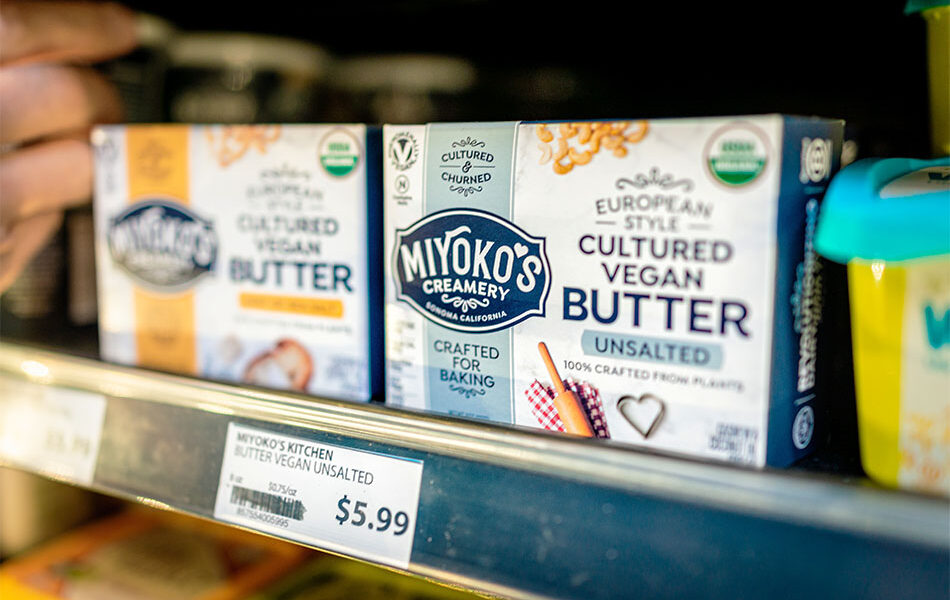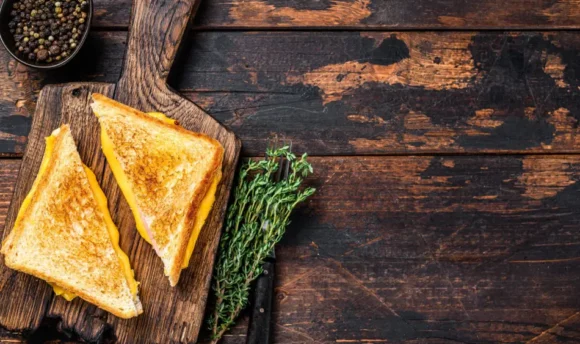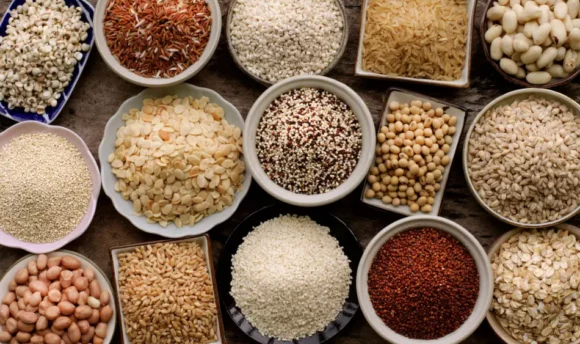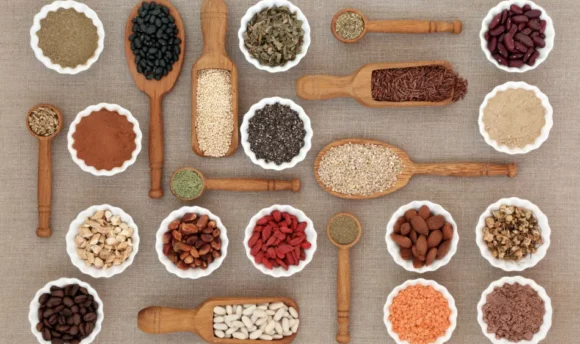Is Vegan Butter Healthy? The Pros and Cons of Dairy Butter Alternatives
Whether you’re beginning a vegan diet or simply looking for healthier alternatives, you might wonder about vegan butter. Is it healthy, and how does it differ from traditional dairy butter? This article covers nutrition facts, health benefits, and disadvantages of vegan butter.

Do you want to cut out dairy?
Perhaps you just want to include more plant-based products in your diet. Whatever your reasons for considering vegan butter, the key question to ask is how it might impact your health. It’s important to review the possible advantages and drawbacks before making a switch.
You might assume that plant-based butter is immediately healthier than traditional dairy butter. However, food that doesn’t contain animal products doesn’t necessarily mean it’s healthy. You still need to consider the nutrition facts, like calories and saturated fat content.
Before purchasing plant-based butter, keep reading for our verdict.
Is Vegan Butter Healthy?
Vegan butter is not particularly healthy. Even though most plant-based butter includes less saturated fat than traditional dairy butter, it still has a lot of it. A high saturated fat intake can raise cholesterol levels and increase your risk of heart disease.
Sometimes, people assume plant butter must be a nutritious choice. Unfortunately, many brands use unhealthy refined oils and add artificial additives and flavors to improve the taste. Reading the nutrition label is crucial if you want to watch what you put into your body.
Overall, plant-based butter is similar nutrition-wise to regular butter, and like regular butter, you must regulate your intake. It’s fine to consume most foods in moderation, but you should aim to find a balance between saturated fat and healthy monounsaturated and polyunsaturated fats.
Look out for organic plant butter with fewer refined oils and artificial ingredients to maintain good heart health.
What Is Vegan Butter?
Vegan butter, also called plant-based or plant butter, is a substitute for dairy butter. Unlike dairy butter, which contains cow’s milk, vegan butter does not contain any animal products. As the name suggests, plant-based butter is made from only plant-based ingredients.
Vegan butter substitutes are similar in texture to the traditional dairy variety. It doesn’t tend to have the same buttery taste, however. People might eat vegan butter when following a plant-based or vegan diet. It can also suit individuals with lactose intolerance and milk allergies.
What is vegan butter made from?
Plant-based butter is made from various plant-based oils. The precise recipe depends on the manufacturer, but popular plant oils include avocado oil, coconut oil, olive oil, and palm kernel oil. Many contain a mix of plant-derived oils and shea butter – another common ingredient.
Other recipes may include soy lecithin and sunflower lecithin.
3 Health Benefits of Vegan Butter
While a vegan butter alternative isn’t necessarily better for you than typical dairy butter, it does hold some benefits. Plant-based butter ticks several boxes for the health-conscious consumer, especially those that want to help make a difference in the world around us.
Here are 3 benefits of replacing dairy butter with a vegan alternative:
#1 Cholesterol-free
It has 0mg of cholesterol. While we need some cholesterol in our diet to maintain good health, people with heart disease risk factors should limit their intake. On average, the American Heart Association recommends that individuals consume no more than 300mg daily.
#2 Lower in saturated fat
While it still contains a significant amount of fat, vegan butter is generally lower in saturated fat than traditional butter. It is also higher in unsaturated fats, including monounsaturated fat and polyunsaturated fat, which are good for the heart because they improve blood cholesterol.
Vegetable oils in vegan butter, like olive oil, palm oil, and sunflower oil, are rich in omega-6 fatty acids. These fats may protect against heart disease when consumed in moderation, but too many may cause inflammation. You should balance them out with omega-3 fatty acids.
#3 Beneficial for the environment
Many people turn to a vegan or plant-based diet to reduce their carbon footprint.
Studies suggest that adopting a plant-based lifestyle can help reduce greenhouse gas emissions, energy consumption, and deforestation caused by meat production. These positive effects make plant-based butter and other vegan food products an important consideration.
Just be wary of those containing palm oil if you are conscious about the environment, as palm oil has negative environmental impacts.
3 Disadvantages of Vegan Butter
Vegan butter has its benefits, but it also has potential downsides. Before adding plant-based butter to your grocery list, you should consider the following disadvantages. Furthermore, always check the nutrition label, as different brands use different recipe ingredients.
#1 Most of them are highly processed
Unfortunately, most butter substitutes are highly processed. They often contain unhealthy preservatives and high amounts of sodium, which can cause high blood pressure over time. A diet rich in highly processed foods can contribute to obesity and chronic diseases.
You can check the label to determine what the product contains before you make a purchase.
#2 Can be more expensive than regular butter
Vegan butter is usually more costly than your average butter. Some brands may charge as much as twice the price, meaning it will not fit into everyone’s budget. If you want to include plant butter in your diet, try to find a balance between the price and the nutritional content.
#3 May contain soy, nuts, or other allergens
Most dairy-free butter is made from soy. Many include nuts in their recipes, such as cashew nuts or nut-based oils, like almond or macadamia oil. These are not ideal for those with soy and nut allergies. You should do some research to find a soy-free or nut-free alternative.
Nutrition Facts of Vegan Butter
You should learn as much as possible about plant-based butter before purchasing. Reviewing the nutrition facts is essential to find out what a product contains. This can help you select the best non-dairy substitute for your dietary needs.
Here’s what you will find in 100g of unsalted, cultured vegan butter.
Nutritional value per 100g
| Calories/ Nutrients (per 100g) | Amount |
| Calories (kcal) | 643 |
| Net Carbs (g) | 0 |
| Fiber (g) | 0 |
| Sugar (g) | 0 |
| Fats (Total) | 71.4 |
| Protein (g) | 0 |
| Cholesterol (mg) | 0 |
Source: https://fdc.nal.usda.gov/fdc-app.html#/food-details/2423670/nutrients
High in calories
Although there is no milk or cream in plant-based butter, it is still a high-calorie food. 100g of cultured vegan butter has 643kcal, and just 1 tablespoon has 90kcal. If you want to speed up weight loss or prevent weight gain, remain mindful of the high calorie content.
High in fats
Vegan butter does not contain trans fats but has a high total fat content. Eating too much saturated fat can raise cholesterol levels and put you at increased risk of heart disease and stroke. The American Heart Association recommends limiting saturated fats in your diet.
No protein
Most plant butter varieties do not contain protein, one of the essential vitamins for your health. However, even traditional dairy butter has little protein. You should get enough protein from other healthy vegan sources, like oatmeal, quinoa, tofu, almonds, and walnuts.
How Can I Use Vegan Butter?
You can use vegan butter the same way as regular butter. Just make a simple swap when following recipes or adding it to your favorite dishes. When looking for a butter alternative, remember you can find salted and unsalted varieties to suit your preference.
Most people use butter as a condiment because of its soft and creamy texture. For example, you can spread it easily on bread, toast, pancakes, and waffles to add flavor and moisture.
Plant butter also works as a butter substitute when cooking, from sautéing and pan-frying vegetables to softening mashed potatoes. Butter is an essential ingredient in baking, so you can use plant butter when baking vegan cakes, pastries, and other delicious homemade treats.
FAQs
No, vegans do not eat real butter as it contains animal-based ingredients, including cream and milk. However, vegans can eat alternatives like vegan or plant-based butter. These products have a buttery taste and texture but do not contain any animal resources.
Vegan butter is made from a combination of water and plant oils. Among the most popular ingredients are coconut, olive, and avocado oil. Plant-based butter is often fortified with vitamins. However, they tend to contain high amounts of calories and saturated fats.
Yes, vegan butter is entirely dairy-free. It is a non-dairy substitute for regular butter, which contains cream and milk, usually from cows. People who are lactose intolerant can enjoy vegan butter because it does not contain lactose – a type of sugar in milk and dairy products.
A Word From a Nutritionist
Vegan butter is a butter substitute that mimics the natural flavor of real butter. Rather than using animal milk, it contains vegetable oil or a vegetable oil blend, among other ingredients, to create a soft and easily spreadable texture.
Plant butter is similar to margarine, another substitute for butter that typically contains vegetable oils rather than animal fats. A person might opt for a vegan edition when following a vegan or plant-based diet, or when limiting or cutting out dairy products from their meals.
Vegan and plant-based diets have many health benefits. As these dietary patterns prioritize whole foods, they can aid weight loss, reduce cancer risk, and improve lifestyle-related diseases. Moreover, they can contribute to significant, positive effects on the planet.
You can also incorporate the vegan diet into other unique diets, such as vegan intermittent fasting or a diabetes diet plan. A healthy vegan diet includes foods like legumes, whole grains, olives, olive oils, nuts, seeds, nut butter, and whole fruits and vegetables.
Talk to a registered dietitian to learn more about adopting a vegan diet.
Conclusion
So, is plant-based butter healthy?
Overall, it is not the healthiest choice for your diet. While it does tend to be lower in saturated fat, it is still high in fat and calories and low in other nutrients. Like anything, you can enjoy plant-based butter in moderation as part of a mindful, balanced diet.
In searching for a good butter alternative, look for plant-based butter without artificial flavors and with lower amounts of refined oils.

















































 Select your language:
Select your language: 








